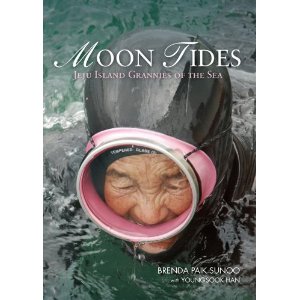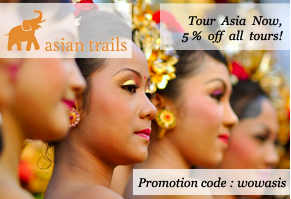 One of the most compelling cultural elements of Korea are the haenyeo, women who free-dive in the sea to catch food and capture seaweed. There are two books currently available on the haenyeo. One of them, Mother of the Sea: the Jeju Haenyeo, is also the subject of a WoWasis book review.
One of the most compelling cultural elements of Korea are the haenyeo, women who free-dive in the sea to catch food and capture seaweed. There are two books currently available on the haenyeo. One of them, Mother of the Sea: the Jeju Haenyeo, is also the subject of a WoWasis book review.
Brenda Paik Sunoo’s Moon Tides: Jeju Island Grannies of the Sea (2011, ISBN 978-89-91913-78-3) is the more recent of the two, and comes from a personal, rather than a documentary perspective. Sunoo makes it clear that she’s got a personal stake in telling the tale. A Korea-American, she views the haenyeo as spiritual sisters, underscored by their similarity in ages. Her quest takes her to Korea’s Jeju island, to write, interview, and photograph. Her photos are more than straight documentary shots, taking in a breadth of material, including diving, family, shamanistic ritual, and market scenes. She includes shots of ageing haenyeo who can no longer care for themselves.
The best parts of the book are the interviews with the divers, shamans, and related individuals. There are 21 of these, 18 or so of which are with the divers themselves. They relate family and marriage histories, how they began as haenyeo divers, and how they sum up their lives, philosophically, at their advanced ages. This is the core of the book, oral histories etched in print, which will form an important part of the haenyeo cultural narrative for the future. Very little is left out. There is an interview with a woman, for example, who specializes in haenyeo songs (“rowing songs,” as she calls them), a rich yet relatively unknown song form from Korea. In including it, the author clearly understands her responsibility in attempting to tell as much of the story as possible.
 Beyond being a book of interest to those interested primarily in haenyeo, the book is an important Korea cultural marker for its revelations regarding working women, island culture, aging, and historical aspects of Jeju’s rebellion against Japanese and Korean conservative social forces in the immediate post-Korean War era. Highly receommended. Buy it here at the WoWasis eStore.
Beyond being a book of interest to those interested primarily in haenyeo, the book is an important Korea cultural marker for its revelations regarding working women, island culture, aging, and historical aspects of Jeju’s rebellion against Japanese and Korean conservative social forces in the immediate post-Korean War era. Highly receommended. Buy it here at the WoWasis eStore.
Leave a Reply